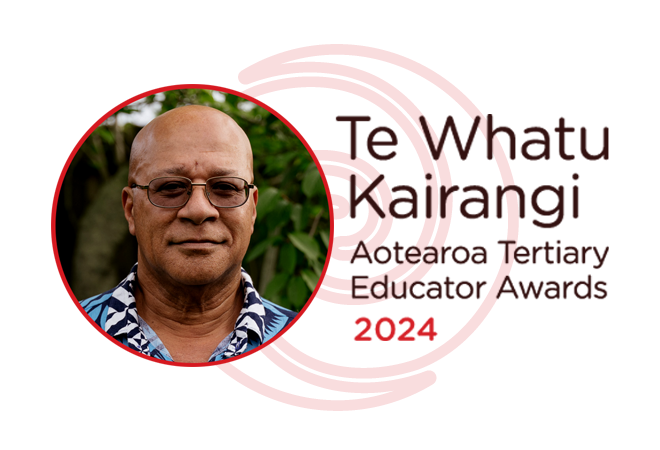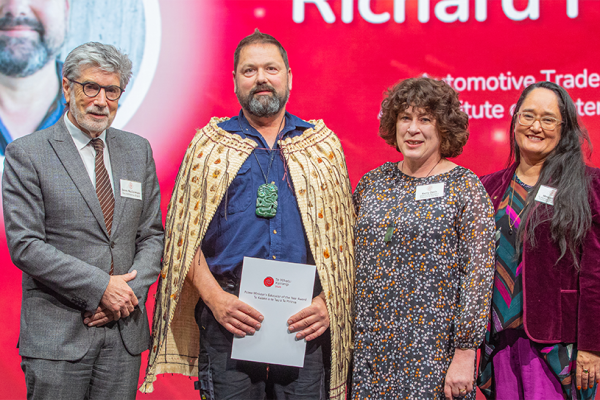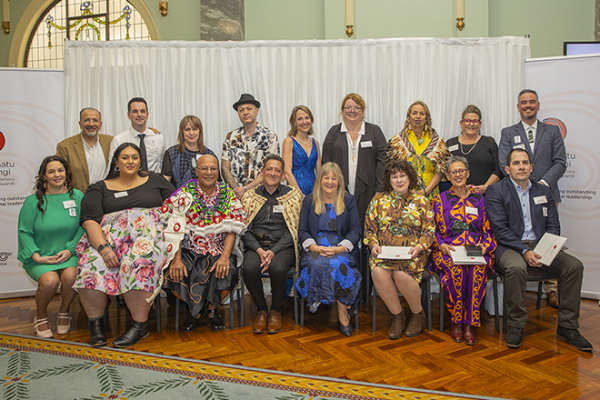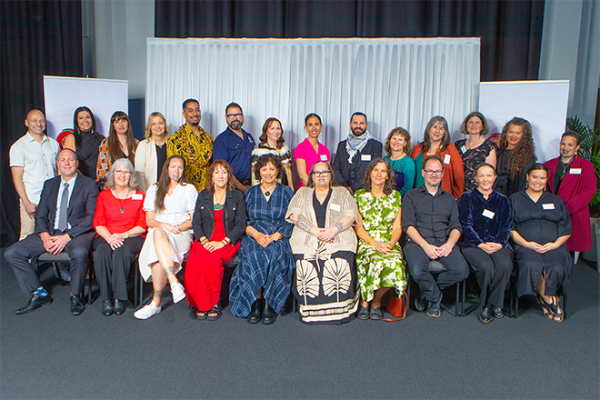Jone Tawaketini
A champion for the Pacific voice, to empower and support Pacific learners
Le Moana Mua Award winner
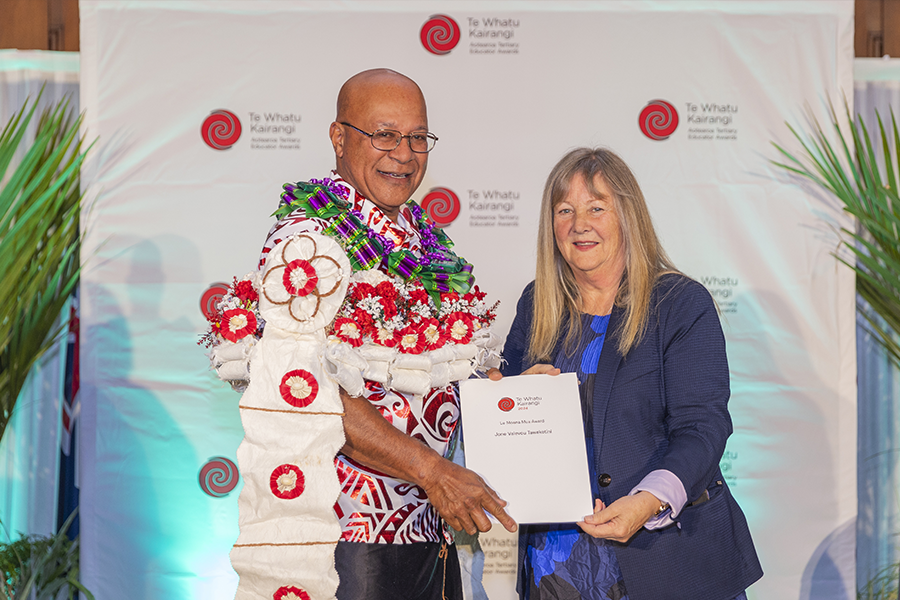
Senior Lecturer, Bachelor of Applied Technology, Unitec
“Our school is very grateful to Jone, his dedication to supporting and leading in Pacific ākonga is exceptional.”(Head of School, Unitec Institute of Technology)
As senior lecturer in the Bachelor of Applied Technology (BAT) programme at Unitec since 2008, Jone aptly describes himself as a phenomenal educator. He is driven by his learner-centric educational philosophy, with a special interest in the needs of Pacific learners. He aims to increase Pacific student success, completion and participation rates, grow the Unitec staff's capability and capacity to empower and support Pacific students, grow Pacific knowledge and awareness, and develop and maintain partnerships with Pacific communities and stakeholders.

An Indigenous Fijian from Keteira village, Moala Island, Lau Group, Jone is proud that Unitec is a leader in the BAT programme, the only Level 7 programme currently on the framework considering modern automotive technology. The course offers a staircase for Trades Level 3 (with high enrolments of Pacific students), creating an opportunity for students to pursue a Bachelor’s degree. Jone’s students are a mixed ethnic group of Pacific students, including New Zealand-born/raised Pacific islanders (NZPI) and international students from the Pacific Islands (PI) of Samoa, Tonga, Niue, Cook Islands, Tuvalu, and Tokelau, Fiji-I-taukei, PNG, and Vanuatu.
When Jone became a Pacific Champion in 2019, he focussed on the BAT automotive students, where he fulfilled this role by finding the resources to implement initiatives, supporting students in overcoming embedded cultural attitudes, and using creativity in his teaching and learning approaches. To his Pacific Champion role, he then added the Electrical Pre-Trade students who are mainly NZPI, under the Maori Pacific Trade Training scholarship. This group of students had been referred to him because Pacific students' enrolment numbers were high, but their success rates were low. He now supports all enrolled Pacific students in both programmes, despite only teaching the BAT.
Jone leads by example by continuing to educate himself informally and formally. He has worked in the industry and studied beyond the Pacific. Since joining Unitec, he has gained a Master in Educational Leadership and Management, with his thesis topic based on The cultural influences on retention of Pasifika students. He has done further research, based on the initiatives he established to contribute to Pacific students' success and retention, and presented at various Pacific symposiums. He attends meetings and sits on boards to ensure that Pacific students and communities are represented and considered in decision-making and represents Pacific staff in the Tertiary Education Union (Unitec Branch). He also supports the Unitec Pacific Centre's initiatives to enhance Pacific capability.
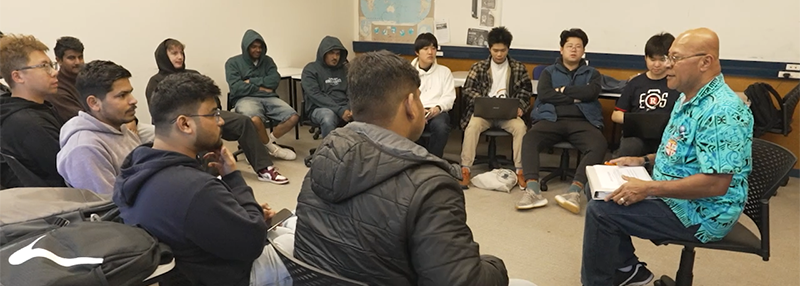
Although Jone started his Unitec career as an academic lecturer, he became a Curriculum Leader in 2010, Discipline Lead/Programme Coordinator in 2021, and Senior Lecturer in 2023. He supports staff development through Professional Development (PD) sessions and is responsible for curriculum development that satisfies industry, community, professional, and student needs. He ensured that the BAT Programme methodology was equitable for Pacific learners and encouraged non-PI staff to take PD on Working with Pacific learners. He also assisted the Academic Programme Manager (APM) in preparing the programme for internal and external audit monitoring and five-year reviews.
Jone reflects and evaluates after every lesson, end-of-topic assessment and programme review to inform future practice. He listens to his students and adapts practical activities. For example, one of his assessments on Road Transport Guidelines required a route risk analysis of moving a house from Unitec to Te Puke. While most students used GPS to gather data for their assessment, some travelled the route, which generated better results. When a student suggested taking a road trip to prove this finding, Jone organised a bus trip, making the field trip an authentic, equitable experience for all. This field trip continues to be part of this assessment, and the concept extended to other course assessments.
Jone believes in truly getting to know his students and appreciating what they bring as learners. He sees them as unique individuals, shaped by their various cultural protocols, traditions, and practices. When he noticed differences between his Tongan students, such as being unable to speak easily to each other, he learned they had varied class backgrounds and realised the culture of respect for a noble can make that student feel isolated from the commoner Tongans. As a result, he used the noble as a leader in group work. In the programme’s assessment changes, he included group activities and talanoa (storytelling). As Unitec requires all to adhere to Te Noho Kotahitanga values, combining these with a Pacific-centric value of talanoa has worked well in his mainstream classroom. Jone says the meaning of talanoa is being able to speak and to be free of all tapu.
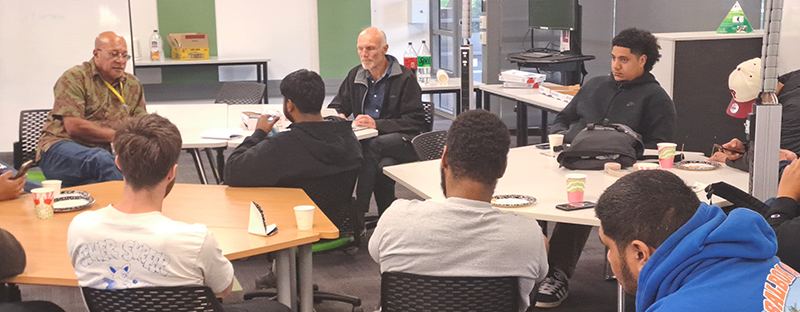
Jone’s work with his Pacific students extends to building trust and rapport with their families and communities. In collaboration with the Unitec Pacific Centre he organises family evenings for Pacific students, staff, and their families, promoting mutual support and confidence. He also established a “bridging the gap” fono with the Trades staff and students, inviting two BAT alumni (PI and Non-PI) as guest speakers, with the aim of showing students the possibility of a higher degree and career pathways. Jone was guest speaker at Mahurangi College during their Pasifika evening in 2023, allowing him to encourage Pacific students to pursue higher education and to advertise Unitec as a possible tertiary pathway. Beyond his lecturer role, he created a village-style talanoa group for his BAT Pacific students in 2008 and later extended this idea, calling it the Bitesize Talanoa. The idea of this is based on time, kai, and learning; bitesized chunks that can be digested in a one-hour lunch session. This Pacific-centric initiative culminated in two research presentations at Te Pukenga Pacific Research Symposium at MIT in 2022 and 2023.
To enhance class retention and success, Jone makes sure his students have fun and he draws on his industry experiences, photographs, videos, and Zoom. His stories about working for BP Oil SW Pacific and living in the SW Pacific resonate with his students, and they are encouraged to share their lived experiences and generate critical thinking. Jone motivates his students and instills good work habits by role modeling, giving them a sense of belonging and empowerment. He values his learners' unique perspectives and encourages them to use their experiences as sources of knowledge and inspiration. He also encourages students to base their industry projects on their countries.
“I deconstruct the deficit myths surrounding Pacific learners by working with the strengths they bring to the classroom and allowing them to embrace their own ways of doing and being.”
Listen to Jone talking about his teaching practice on the RNZ Pacific waves programme
